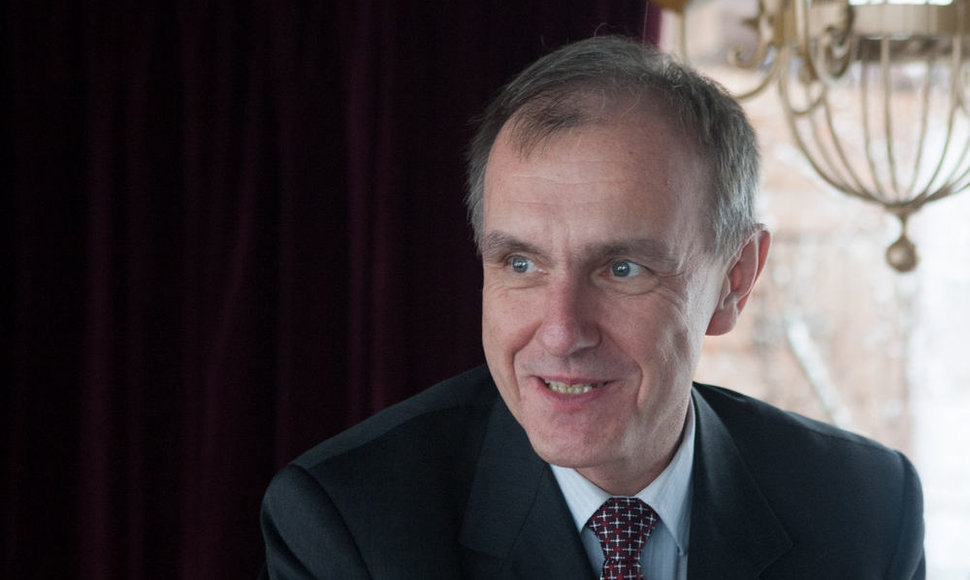– Vilnius-Warsaw liaisons are not at their best at the moment. Lithuanian President Dalia Grybauskaitė snapped at Poland last year, when she said that some of its politicians decided to make friends with Russia at the expense of Lithuania and that Lithuanian-Polish relations needed a pause. How much oil on the flame did her words pour?
– I do not wish to imply that our relations are in a crisis. But there are certain misunderstandings and particular issues that need to be settled.
I am personally convinced that strategic cooperation between Lithuania and Poland is crucial to the security of our nations. There won't be a secure Poland without a stable and secure Lithuania. And vice versa – I believe that a stable and secure Lithuania is impossible without a stable and secure Poland. The link is not just historic – it has very much to do with things as they stand today.
Therefore we must continue to talk about security in one voice.
– Is it something that we do?
– We have, for the last ten years. But due to problems faced by the Polish national minority here – that the previous government failed to solve – the Polish government was and still is hoping to return to these issues and to overcome these obstacles. It has mostly to do with spelling of names and education. The Polish government does not expect anything more than respect for common standards – European standards that are respected in Poland and relevant to the Lithuanian – as well as Belarusian, Ukrainian, German – national minority.
In my country, the first statement by your new Minister of Foreign Affairs Linas Linkevičius was duly noted and appreciated. We listened to his words carefully. We believe that Lithuania must take the first practical step in order for us to return to comprehensive mutual understanding we could have enjoyed for years.
– After the Lithuanian-Polish friendship treaty (signed in 1994), we seemed to have sunk into a forgetful bliss, failing to solve tangible problems. Perhaps we have delayed too much in the past to settle some matters straight and move on?
– Future is what I would like to talk about. It is up to the government to find energy and courage to solve complicated issues. I guess they are tough to solve in Lithuania itself, but with enough courage, it is possible to create a new environment for our cooperation.
To my mind, cooperation in security should be the main goal for our two governments. The world is changing, and our neighbours do too. We are witnessing processes in Eastern Europe that are threatening to Lithuania, Poland, and other countries. As we face these changes, we should act in concert.
For example, there will be the military training operation Steadfast Jazz. I can still recall how, along with your ministers Juozas Olekas and Rasa Juknevičienė, we used to ask for similar “live” training, quoting Article 5 of the NATO treaty. It would demonstrate a unified response from NATO forces. For the first time in the history of NATO, such training will take place in Eastern and Central Europe. And this is not the end. We must speak in one voice about NATO commitments set out in Article 5.
We must speak about keeping financing from NATO Security Investment Program at least at its current level. The money is crucial in upgrading military bases in Poland, Lithuania, Latvia, and Estonia.
We must speak about a visible presence of NATO in our territories. Being a big friend of Lithuania as I am, I have reiterated on numerous occasions in the North Atlantic Council the need to establish NATO institutions not just in Poland, but also in the Baltic states and other countries in Central-Eastern Europe.
Fourth, I am sure that one of the key tasks for the future is cooperation among special services. Poland has invested a lot into creating the service, while your well-trained special services are active in a complicated region of Afghanistan, the south. This partnership could be significant.
Let me reveal you a dream of mine. When I was appointed vice-minister of defence in 1999, I was put in charge of setting up joint Polish-Ukrainian and Polish-Lithuanian battalions. When I returned to the ministry in 2007, as the minister this time, I found there a project for a trilateral Lithuanian-Polish-Ukrainian battalion. That is not enough, I say, what we need is a brigade. So we presented and discussed the concept, had a memorandum signed in Brussels some three years ago. The project is still waiting for its moment to be realized. I believe that now is a good time to move ahead. As far as I know, Lithuania's new government is inclined to undertake the project. The same is true of Warsaw. Now we need a final blessing from Ukraine's minister. I hope that the brigade will be set up in the near future.
– The stalemate in bilateral relations is also the result of Poland's politics. The tensions had abated somewhat, before Foreign Minister Radoslaw Sikorski said last summer that Lithuania was undermining Polish national minority rights. According to him, Poland was ready for a new opening in bilateral relations, but the “reset” had to be linked to Lithuania's carrying out its obligations. Are Poles themselves ready for that?
– Yes. The Polish society value Lithuanians as their partners. We are not just neighbours, we share common interests. Therefore the Polish side will be ready to return to good mutual cooperation with Lithuania, as long as this attitude prevails on both sides.
Cooperation agenda includes something more than just military security – but energy security and trade growth as well.
– Some Lithuanians believe that the Polish minority are digging for problems where there are none, that they are deliberately driving a wedge. In their turn, the Poles are accusing Lithuanians of abusing their rights. Will our nations ever be able to live peacefully, like normal neighbours?
– I am certain it will happen – for the sake of the past. I remember how a close friend of mine, celebrated Polish documentary filmmaker Wojciech Szumowski, who decided to come to your parliament in January 1991 and not just be a witness to your fight for freedom but a participant as well. So he took his camera and set off for the parliament building. When he returned to Krakow, he showed to his friends – including me – the images from Vilnius and later made a film about the origins of independence. At the time, this was a powerful political message that greatly influenced my attitudes.
I remember how, during the first decade after the independence, the communication between Lithuanian and Polish governments was much better. All we have to do, I believe, is to return to those times. This is my hope.
***
Bogdan Klich came to Lithuania to attend the informal Snow Meeting in Trakai.
Born in 1960 ik Krakow, Klich was Poland's deputy-chief negotiator in talks on EU membership between 1989 and 1999. Later, he was appointed vice-minister of defence.
2001-2004 Klich served as a member of the Polish parliament, 2004-2007 elected to the European Parliament.
Klich was appointed minister of defence in autumn 2007, but resigned in July 2011, after a report on the plain crash in Smolensk, where President Lech Kaczynski and a number of high politicians were killed, put the blame on the pilots and Polish officials.













